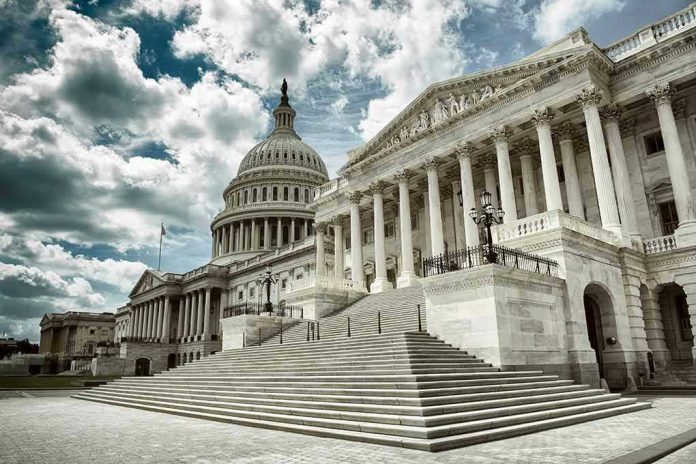
Three D.C. teenagers now face the full force of federal prosecution as adults after a shocking Capitol Hill armed robbery spree, reigniting the city’s bitter debate over juvenile justice and public safety.
At a Glance
- Three juveniles, ages 16-17, charged as adults in federal court for a spree of seven armed robberies in Capitol Hill.
- Authorities cite the severity and brazenness of the crimes as justification for bypassing the juvenile system.
- The case underscores growing frustration with youth-involved violent crime and demands for tougher prosecution in D.C.
- Community divided over priorities: safety and accountability versus rehabilitation and reform for juvenile offenders.
Juvenile Robbery Spree Rocks Capitol Hill
Residents of Capitol Hill awoke in shock after a rash of seven armed robberies unfolded in just two hours on December 2, 2024. Three teens, all hailing from Southeast D.C., brandished firearms, threatened innocent civilians, and stole personal belongings—then fled the scenes in a stolen vehicle, leaving a trail of fear and frustration in their wake. The Metropolitan Police Department wasted no time, launching an intensive investigation, releasing surveillance images, and imploring the public for information. Suddenly, what was supposed to be a safe neighborhood—close to schools and government offices—became the epicenter of a raging debate about crime, parenting, and what it takes to reclaim our communities.
Feds charge 3 D.C. teens as adults for Capitol Hill robberies https://t.co/NA0Ip6lhz3
— The Washington Times (@WashTimes) July 26, 2025
This robbery spree wasn’t just some kids making a bad decision. It was calculated, violent, and—let’s be honest—emblematic of a much bigger problem that’s been festering in D.C. for years: the emboldening of youth criminals and the utter failure of soft-on-crime policies that have left law-abiding citizens feeling like hostages in their own neighborhoods. The MPD’s quick action was commendable, but the fact that such crimes continue to escalate proves that the system has been broken by years of misplaced priorities and political games.
Prosecutors Take Gloves Off: Charging Teens as Adults
The U.S. Attorney’s Office for the District of Columbia threw down the gauntlet, announcing in June 2025 that the suspects—despite their ages—would be prosecuted as adults in federal court. Make no mistake: this is not some technicality. Charging juveniles as adults is rare, reserved for the most serious, violent felonies. But when you see teenagers running through neighborhoods, waving guns, and robbing citizens in broad daylight, what other choice is there? The message is clear: enough is enough. The revolving door of catch-and-release is over, at least in these high-profile cases, and prosecutors made it clear that the days of coddling violent offenders—regardless of age—are finished.
One 16-year-old was arrested in late February after a D.C. Superior Court custody order. All three suspects are now in custody, awaiting trial in federal court. The U.S. Attorney’s Office cited the “severity and pattern” of the crimes as justification for bypassing the juvenile justice system. Public safety, not political correctness, is finally getting the attention it deserves. Yet, even as authorities take real action, activists and “reformers” are out in force demanding rehabilitation and second chances. The question remains: how many chances should armed robbers get before the rest of us can walk our streets in peace?
Community Outrage and the Fight for Accountability
Capitol Hill residents aren’t just upset—they’re furious, and rightfully so. Families have been demanding answers, tougher prosecution, and a real crackdown on violent crime. The economic toll is mounting: businesses are spending more on security, property values are threatened, and the area’s reputation is on the line. It’s not just about one night of violence; it’s about the years of failed leadership that have prioritized the rights of criminals over the safety of ordinary Americans. The fact that some community leaders still insist on “restorative justice” and more programs for youth offenders is a slap in the face to every family that’s been victimized.
Victims of these robberies face trauma and loss, their sense of safety shattered. Residents and business owners worry about what’s next, as the city struggles to find a balance between holding criminals accountable and offering real deterrence. The debate over justice reform versus tough prosecution has never been more intense. For many, the only answer is clear: enforce the law, protect citizens, and make it clear that violent crime—no matter the age of the perpetrator—will not be tolerated.
Long-Term Impact: A Turning Point for Juvenile Justice?
This case could set a precedent for how D.C. handles violent juvenile offenders going forward. If the courts follow through and these teens receive real sentences, it may finally send a message that the days of slap-on-the-wrist justice are over. Law enforcement officials argue that adult prosecution is the only way to deter future sprees, while activists warn of negative lifelong impacts for the offenders. The truth is, the consequences for criminals must be real if we want safer streets.
The broader implications are clear: as urban crime surges nationwide, more cities may look to federal prosecution and tougher sentencing for juvenile felons. The Capitol Hill robbery spree is a wake-up call for anyone still clinging to failed “reform” strategies. If we want to restore order and protect our communities, it starts with holding criminals—no matter their age—fully responsible for their actions.
Sources:
Metropolitan Police Department Press Release: Arrest of Suspect in Southeast Armed Robbery
Metropolitan Police Department Press Release: Seeking Suspects and Vehicle in Robberies (Update)
HillRag: Police Seek Suspects in Monday Robbery Spree














